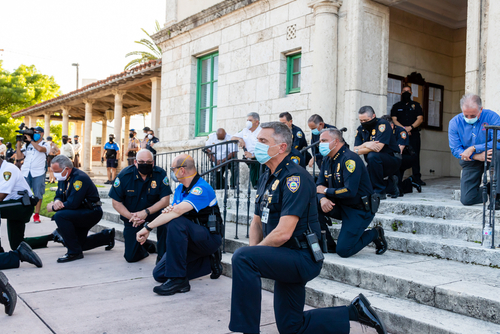President Trump and GOP leaders are changing their stance on police prosecutions, granting pardons and commutations to convicted officers. This move has sparked accusations of hypocrisy, particularly regarding their stance on law enforcement support. Amid escalating political controversy, Trump’s GOP is pushing a contentious plan to exonerate convicted police officers, prompting concerns about police accountability and justice.
Changing Political Narratives on Policing
The recent endeavors by Trump and GOP lawmakers demonstrate a significant maneuver in the political narrative surrounding law enforcement. Amidst a backdrop of changing public sentiment post-George Floyd’s death, there is an increasing trend to reevaluate convictions of police officers. This development reflects a strategic shift in political alignment, potentially reducing the momentum of the anti-police narrative that surged over the past years.
If Trump pardons any of the 1500+ J6 criminal defendants —many charged with assaulting police officers — then the Republican Party will choose violent insurrectionists over brave law enforcement officers.
Are there any Rs in Congress who will stand up for law enforcement? pic.twitter.com/hsGxVXNTYJ
— Daniel Goldman (@danielsgoldman) January 9, 2025
Notably, Trump’s speech to Congress reiterating his intent to protect and support police has evoked a range of reactions. Former Capitol Police Officer Harry Dunn expressed discontent, highlighting contradictions in Trump’s statements compared to his actions during and post the January 6th events.
Governors and Pardoning Powers
Republican governors are actively using pardons to counter what they perceive as politically motivated prosecutions of police officers. For instance, Virginia Governor Glenn Youngkin recently commuted a police officer’s sentence in a contentious shooting incident in 2023. Similarly, Missouri’s governor pardoned an officer implicated in a 2021 shooting, showcasing a political strategy to amend past convictions.
Violent criminals convicted of assaulting police are free because Donald Trump pardoned them. And today, Republicans blocked @SenateDems' resolution to condemn those pardons.
This is a disgusting betrayal of our law enforcement who put their lives on the line to keep us safe. pic.twitter.com/2KUa2RpxHS
— Senator Cortez Masto (@SenCortezMasto) January 29, 2025
“I am convinced that the court’s sentence of incarceration is unjust and violates the cornerstone of our justice system — that similarly situated individuals receive proportionate sentences.” – Mr. Youngkin.
This shift implies efforts to reinterpret law enforcement actions under a new light, influenced by both media narratives and public pressure that initially spurred these prosecutions.
Media Influence and Public Perception
Media narratives play a significant role in shaping public perception, affecting legal outcomes, and policing decisions nationwide. Critics argue the media has often leaned toward an anti-police stance, gradually shifting its portrayal after intense public scrutiny and backlash.
“very biased mainstream media narrative about law enforcement” – Jason Johnson.
Specific cases like those of Wesley Shifflett in Virginia and Terence Sutton and Andrew Zabavsky in D.C. highlight controversial circumstances where actions were taken under considerable media pressure. As officials re-examine these instances, it questions the fairness and motivations driving such legal actions against officers.
Sources:

